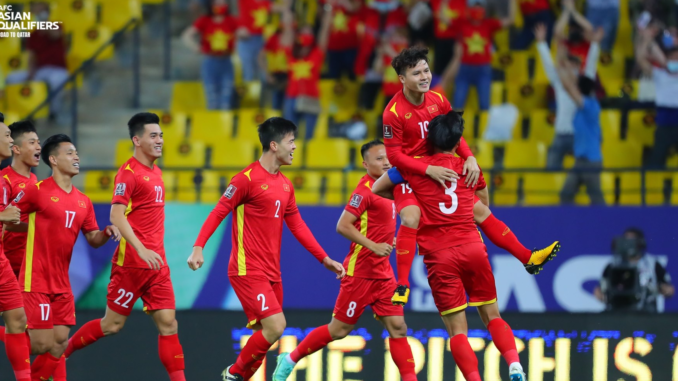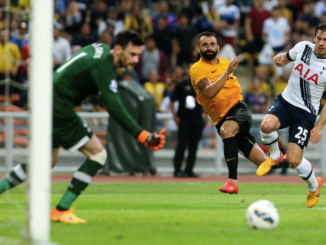
Nguyen Quang Hai, Nguyen Hoang Duc, Ho Tan Tai, Ha Duc Chinh and Nguyen Tien Linh.
All five were starters for Vietnam in their final outing at the recently completed AFF Suzuki Cup, where they fell out of the tournament at the semi-final stage, and all five also featured prominently in their nation’s campaign at the FIFA U20 World Cup back in 2017.
Fast forward a year to the final of the AFC U23 Championships and add Do Duy Manh, Vu Vanh Thanh, Pham Duc Huy, Phan Van Duc, Luong Xuan Truong, Nguyen Phong Hong Duy, Nguyen Cong Phuong and Pham Xuan Manh to the list of players that featured in that match who were also part of the recent Suzuki Cup squad.
That youth tournament was the first major campaign overseen by coach Park Hang-seo – still in place and with a new contract extension four years on – and was supposed to herald a bright new era for Vietnamese football.
For a while everything seemed to come together as planned as the Golden Star Warriors won the 2018 AFF Suzuki Cup and followed that up with a run to the quarter-finals of the AFC Asian Cup in early 2019.
Three wins and two draws in the second round of qualification for the World Cup in 2019 continued the nation’s ascent – results wise – but just as the pandemic struck things started to unravel.
With most of Asia in lockdown the nation didn’t play a single competitive match in 2020, the league was shuttered for most of that year as well as 2021, and teams in the V.League have only played 25 matches since October 2019.
The national team resumed activity in mid-2021 where things totally fell apart as the promise of moving from regional powerhouse to continental contender evaporated as they lost seven straight matches to all but tumble out of the World Cup qualifiers.
Failure to defend their Suzuki Cup crown also saw plenty of questions raised about just where things sit for Vietnam.
The term ‘golden generation’ is often placed on a group of players prematurely but there’s no question that the young talents that burst onto the scene back in 2017, in what was the nation’s first appearance on the global stage, had a rare quality about them.
The fact that the bulk of the side that formed as 18-20 year-olds back in 2017/2018 remains the backbone of the senior side five years on is testament to that quality.
So what is happening?
Firstly, the fact that the entire national squad remains domestically based – in a league that’s essentially been in hiatus for two years – has seen those careers stagnate just at the point when they should be flourishing.
The reasons behind the lack of movement are complex and we’ll touch on them in the weeks ahead but a combination of a lack of willingness to move, clubs refusing to listen to reasonable offers and poor scouting within the region and beyond have seen the stars of this generation dimming their talent.
That must change and it must change quickly as this squad has reached the upper limit of what they can be expected to do within the domestic scene, and the failure of this generation to grow and develop abroad could stymie the chances of the next generation – seemingly not at the same technical level – to also try and move to higher levels outside of Vietnam.
One of the other major issues, as I’ve touched on repeatedly over the past few years, is a rigid and unwavering tactical system that fails to maximise the best characteristics of the playing group.
There’s a better chance of Christmas being moved to July than there is of the coach, Park, changing his 3-4-2-1 setup that has been in place throughout almost every match in which he’s taken charge.
Even at regional level, the underlying principles of how he sets the team up is one rooted in a conservative philosophy.
Defend deep in compact blocks, don’t take risks in possession and once the ball is lost retreat immediately rather than pushing to win it back high up the pitch; all of that has made Vietnam a hard nation to break down, to the point where only two of those seven straight defeats last year were by more than one goal.
On the other hand, the stress on the creative outlets further forward – which is where their greatest potential lives – is extreme in having to try and conjure up moments of individual quality in the limited time that they have in the advanced areas of the pitch.
Failure to score – or create much of note at all – against Australia, Japan and Saudi Arabia cruelled their World Cup hopes and an inability to score in 180 minutes against Thailand ended the nations’ Suzuki Cup campaign.
With the team essentially already out of the running for the World Cup now would have been an ideal time to experiment.
Even with a host of players set to miss out in the qualifiers this week – in Australia and then at home to China – due to injury, suspension and COVID issues, the squad still has a very familiar feel to it and you can set your watch to the way that they’ll be set up tactically.
Is this enough?
Things are now at a crucial juncture for the nation where they need to decide whether or not to continue down this path.
Do they want to become a nation famed for being difficult to break down and a threat at regional level or can they find a coach, married with players prepared to test themselves abroad, that will allow their creative stars to play with freedom before they squander the best years of this rare generation?
Photo: Asian Football Confederation
Listen to Episode 77 of The Asian Game podcast as we debate where Vietnam, and Southeast Asian football, is at and how it can improve




